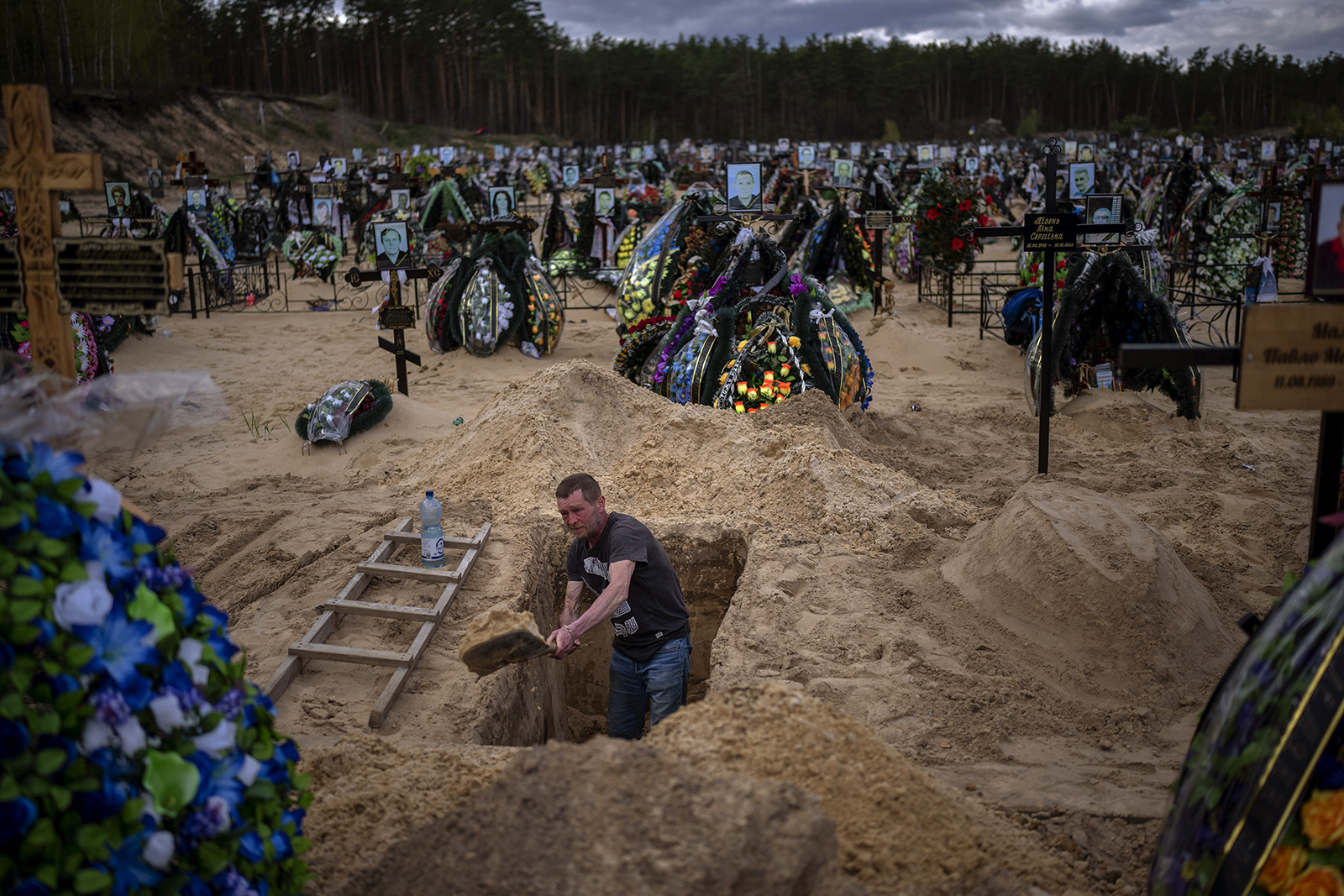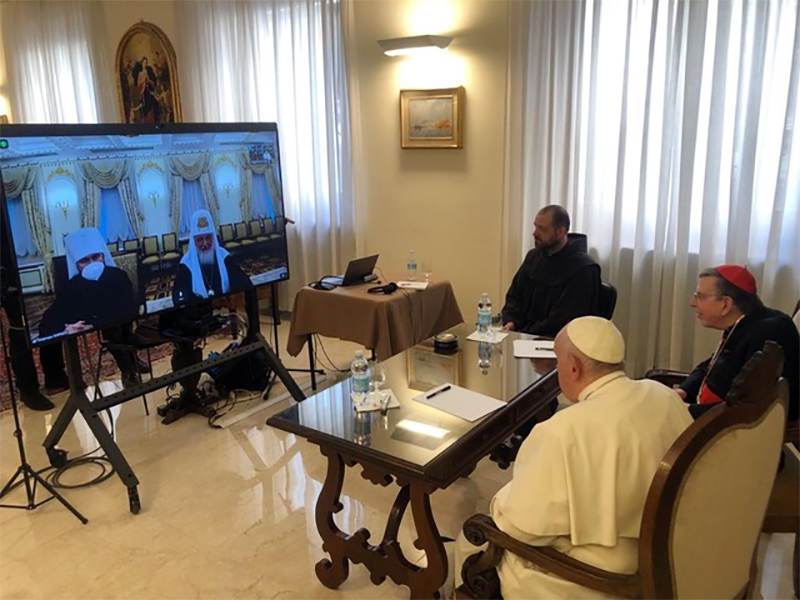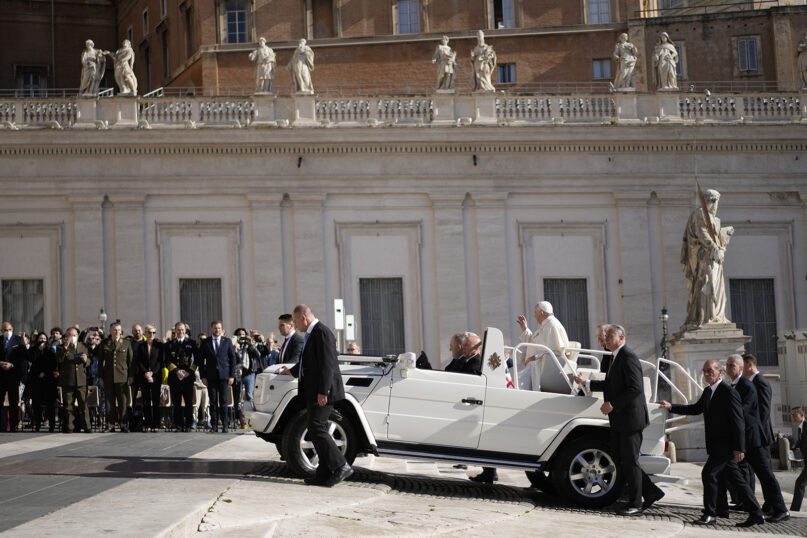VATICAN CITY (RNS) — Pope Francis told an Italian newspaper on Tuesday (May 3) that NATO may be partly to blame for Russia’s invasion of Ukraine, and he said he hopes to visit Moscow to meet with Russian President Vladimir Putin in hopes of brokering a peace.
Talking to reporters from Il Corriere della Sera, Francis said that “NATO barking at Russia’s doors” may have raised alarms in the Kremlin about the Western European alliance’s intentions in Ukraine. “I can’t say if (Russia’s) anger was provoked,” he continued, “but facilitated, maybe yes.”
In the interview, Francis again recalled his first reaction to the news of the invasion in late February. On the first day of war, he said, he called Ukrainian President Volodymyr Zelenskyy and then left his apartment on an impromptu visit to Aleksandr Avdeyev, Russia’s ambassador to the Holy See. “I wanted to make a clear gesture for the whole world to see and for this reason I went to the Russian ambassador,” the pope said.
The pope praised Vatican Secretary of State Cardinal Pietro Parolin for his role in seeking diplomacy options for a resolution to the war. “A great diplomat,” the pope said about his second in command at the Vatican. “He knows how to move in this world, I trust and confide in him a lot.”
Parolin issued a message from the pope to Putin after 20 days of war in Ukraine, Francis said, which stated his intention to visit Moscow. “We have not yet received an answer and we are still pushing,” the pope said, “even if I fear that Putin does not want to have this meeting at this time.”

A gravedigger identified only as Alexander digs a grave at the cemetery of Irpin, on the outskirts of Kyiv, Ukraine, on April 27, 2022. (AP Photo/Emilio Morenatti)
Referring to a conflict that has already caused almost 3,000 civilian casualties, according to the United Nations, the pope asked, “How can you stop such brutality?” He seemed to compare the violence in Ukraine to the genocide in Rwanda in 1994.
While expressing his intention to become the first pope to visit Russia, a dream long harbored by his predecessors, Francis said that he will not visit Kyiv for the time being. The pope has sent two representatives, Cardinal Konrad Krajewski and Cardinal Michael Czerny, to the Ukrainian border as a show of closeness with the Ukrainian people.
“But I feel that I mustn’t go,” he said. “I must first go to Moscow, I must first meet with Putin. But I am a priest, what can I do? I do what I can. If only Putin would open the door.”
Francis also addressed Orthodox Patriarch of Moscow Kirill, with whom the Vatican has entertained multiple diplomatic efforts and whom the pope met for the first time in Havana in 2016. Since the beginning of conflict, Kirill has been an outspoken supporter of Putin’s claim for hegemony in Ukraine, raising tensions in Catholic-Orthodox relations.
Kirill spoke to Francis via Zoom conference on March 16 since their meeting, originally scheduled March 16 in Jerusalem, had to be canceled due to the start of the Russian-Ukrainian conflict. “Holding a paper in his hands, (Kirill) read me all the justifications for the war for the first 20 minutes,” Francis said.

Pope Francis, right, and Russian Orthodox Patriarch Kirill of Moscow meet via video, March 16, 2022. Photo courtesy of Vatican Media
“Brother, we are not clerics of the state,” Francis was said to have replied. “We cannot use the language of politics, but of Jesus. For this reason, we must seek roads to peace, to cease the firing of weapons.”
“The Patriarch cannot be transformed into Putin’s altar boy,” Francis said, adding that Kirill now agrees on the need to find a road to peace.
RELATED: World Council of Churches urges Patriarch Kirill to lobby for Easter cease-fire
Since the beginning of his pontificate, Francis has been a strong voice for disarmament, be it while praying at the sites of the nuclear bombings in Hiroshima and Nagasaki in Japan or begging for peace in war-torn Yemen. Asked about his position on sending weapons to assist the Ukrainian people against Russia, the pope appeared ambivalent.
“I can’t answer, I am too far away,” he said. “What is clear is that in that land, weapons are being tested. Russia now knows that tanks are not very useful, and they are thinking about other things. That is why you make wars: to test the weapons we have created.”
Francis said that while rarely contested, “arms sales are a scandal.”
During the Via Crucis procession at Rome’s Colosseum on April 15, Francis spoke about his concerns about a third world war fought piecemeal in every corner of the world, and those concerns were still on his mind in the interview. “In Syria, Yemen, Iraq, Africa, one war after another,” the pope said. “In every little piece there are international interests.
“One cannot think that a free state can make war with another free state,” Francis continued, adding that “in Ukraine it was others who caused the conflict.”
Francis said that Ukrainians are “a martyred people,” deeply wounded from the aftermath of the Second World War and Soviet occupation.
The conflict in Ukraine seems to have bettered the Vatican’s relations with Hungarian leader Viktor Orban, who told the pope of Russia’s plan to somehow resolve the conflict May 9. “I hope that’s the case and it would explain the quickness of the escalation these past days,” Francis said.
“I am a pessimist,” the pope added, “but we must do every possible gesture to stop the war.”
RELATED: ‘All war is anachronistic’: Pope Francis struggles to gain traction for peaceful vision





